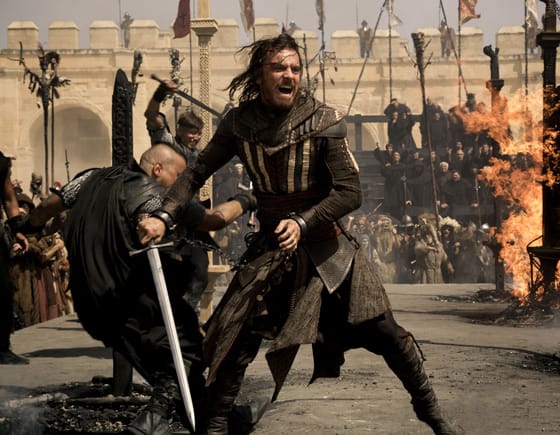The relationship between movies and video games has consistently proven itself to be a tumultuous one, with screen adaptations of console titles and games based on box office smashes rarely proving successful in either situation. Justin Kurzel is the latest director to try turning the trick with Assassin's Creed, the first full-length film adapted from the wildly popular Ubisoft game franchise. Almost unsurprisingly, it does little to change the notion that gaming spinoff films can never be as good as their source material.
In writing a new character into the game's vast historical timeline, the film focuses on Callum Lynch (Michael Fassbender), a criminal saved from his execution by shadowy pharmaceutical company Abstergo Industries. Operating as a modern day front for the Templar Order, Abstergo values Lynch for his assassin ancestry, making him participate in the "Animus project" to relive memories locked deep inside his genetics. While in the Animus, Lynch experiences the world of 15th century Spanish assassin Aguilar de Nerha, who is in search of an ancient Apple of Eden artifact. Lynch is charged with uncovering the Apple's whereabouts within his ancestor's memory and reclaiming it for the Templars, who plan on using its power to eliminate violence and control humanity.
If one hasn't played, or at least taken a cursory glance at the history between Assassins and Templars prior to viewing the film, the dialogue isn't terribly helpful in bringing people up to speed. As Lynch, Fassbender spends much of the film's early going failing to find concrete answers to questions such as "Where am I" or "What the fuck is going on," instead only assured by the emotionless Abstergo father/daughter duo of Dr. Alan (Jeremy Irons) and Sophia Rikkin (Marion Cotillard) that he's there "to help them out."
Fight scenes within Lynch's memory that are chock full of impressive Assassin moves and visual effects are at times marred by jump cuts, and there's little to no historical context provided when it comes to the Apple's location, what power it truly possesses or what greater consequences it could have on present day society. Of course, these are all topics that could be explored in further films, as this first one sets things up for a sequel in rather obvious fashion.
Though Assassin's Creed's camera work and CGI can dazzle in moments, the film feels overwhelmingly like another video game spinoff missing the mark with its silver screen rework. If you wish to delve into the series' incredibly detailed history, one might be wiser to stick to the games themselves.
(Fox)In writing a new character into the game's vast historical timeline, the film focuses on Callum Lynch (Michael Fassbender), a criminal saved from his execution by shadowy pharmaceutical company Abstergo Industries. Operating as a modern day front for the Templar Order, Abstergo values Lynch for his assassin ancestry, making him participate in the "Animus project" to relive memories locked deep inside his genetics. While in the Animus, Lynch experiences the world of 15th century Spanish assassin Aguilar de Nerha, who is in search of an ancient Apple of Eden artifact. Lynch is charged with uncovering the Apple's whereabouts within his ancestor's memory and reclaiming it for the Templars, who plan on using its power to eliminate violence and control humanity.
If one hasn't played, or at least taken a cursory glance at the history between Assassins and Templars prior to viewing the film, the dialogue isn't terribly helpful in bringing people up to speed. As Lynch, Fassbender spends much of the film's early going failing to find concrete answers to questions such as "Where am I" or "What the fuck is going on," instead only assured by the emotionless Abstergo father/daughter duo of Dr. Alan (Jeremy Irons) and Sophia Rikkin (Marion Cotillard) that he's there "to help them out."
Fight scenes within Lynch's memory that are chock full of impressive Assassin moves and visual effects are at times marred by jump cuts, and there's little to no historical context provided when it comes to the Apple's location, what power it truly possesses or what greater consequences it could have on present day society. Of course, these are all topics that could be explored in further films, as this first one sets things up for a sequel in rather obvious fashion.
Though Assassin's Creed's camera work and CGI can dazzle in moments, the film feels overwhelmingly like another video game spinoff missing the mark with its silver screen rework. If you wish to delve into the series' incredibly detailed history, one might be wiser to stick to the games themselves.
